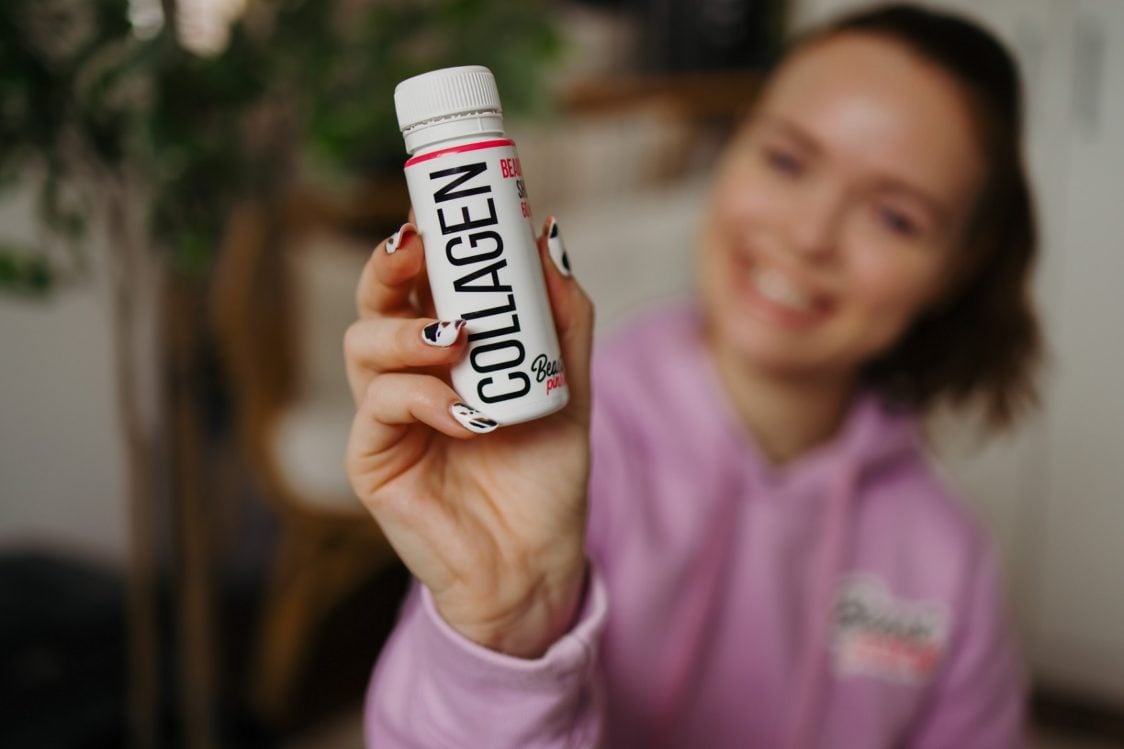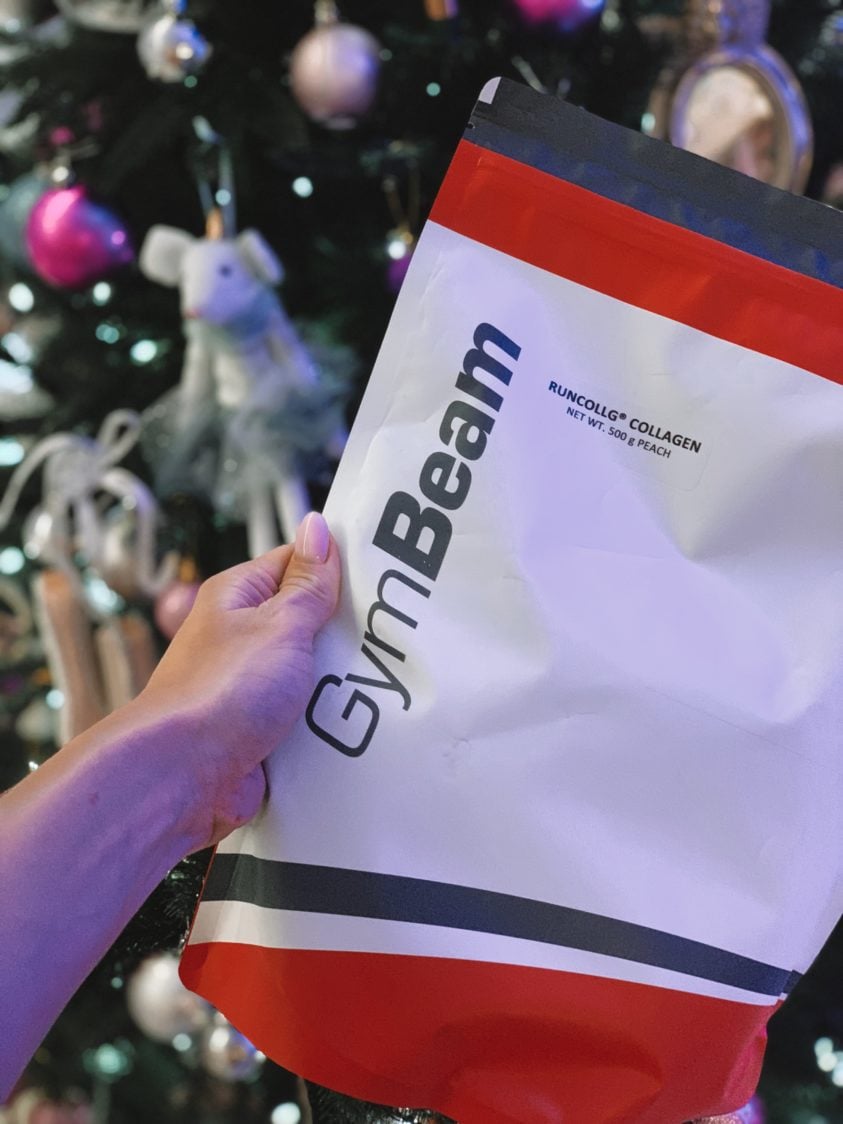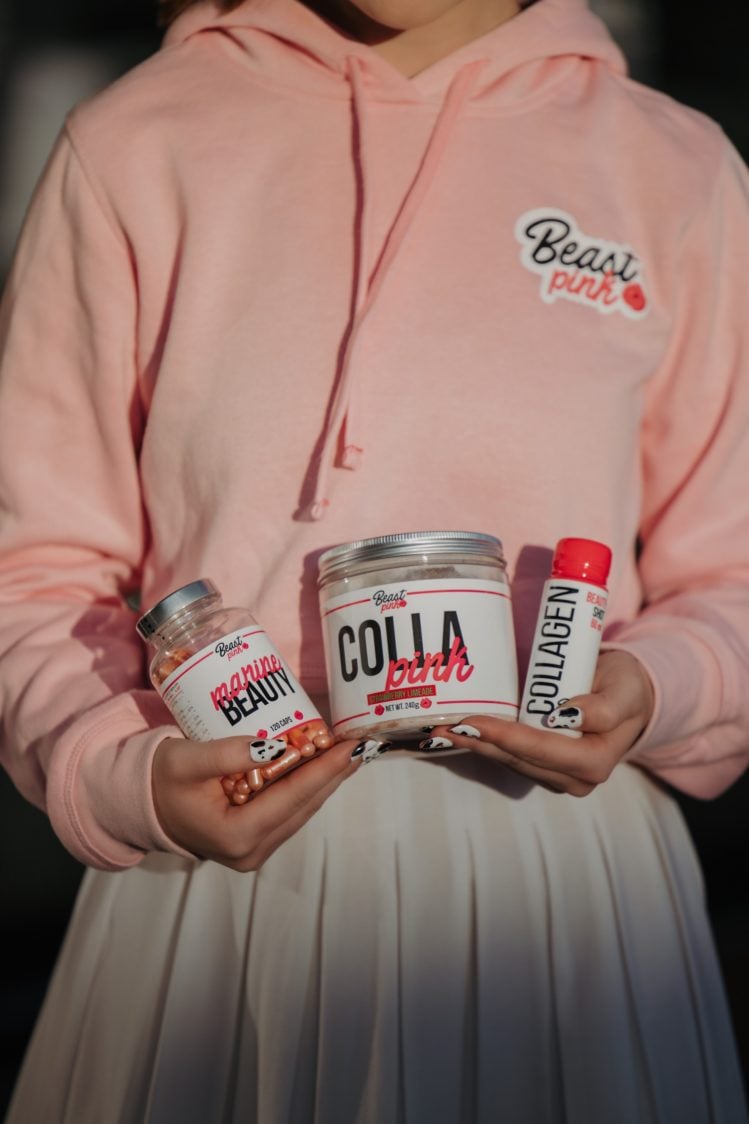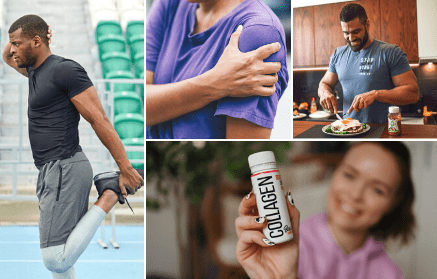Table of Contents
Joint pain can be annoying not only during virtually all sports activities but even normal daily activities. Have you ever experienced knee pain when walking up stairs or squatting? In today’s article, we will introduce an aid called collagen, which could prevent joint pain or even alleviate it. However, choosing the right collagen for your joints may not be easy. There are several types, each suitable for something different. So what type of collagen is most suitable for the joints and what criteria you should focus on when choosing?
What is collagen?
Collagen can be simply described as a protein that is most abundant in the mammalian body. It is a key structural component of connective tissues in bones, liver, kidneys, heart, teeth and skin. Individual types of collagen are evenly distributed in the body. If there was a significant increase in one type over another, tissue stiffness could occur or, conversely, there could be a significant increase in elasticity. [1]
What types of collagen exist?
In total, there are several types of collagen, each of which is predominantly present in a different tissue. The table shows some of them: [2][3]
The first four types of collagen are mainly found in human body. Type I collagen makes up 90% of the total collagen in the body and excels in its strength. In the tendons, it connects muscles with bones, so it must be able to withstand great force. The second type is the main collagen in the cartilage, which helps absorb shocks. The third type supports the structure of muscles, organs and arteries, and the fourth type is located in the skin, where it helps with filtration. [2]

How to detect a lack of collagen in the body?
Collagen deficiency manifests itself in many ways. It is often related to age, but it is not a necessary condition. Manifestations can be observed on the skin, hair and nails. Due to the physical abilities of the body, the tendons and ligaments may stiffen, not have such flexibility, and the muscles will gradually shrink and become weaker. However, you may also experience joint pain and other signs of osteoarthritis (a degenerative joint disease). However, digestive problems are also no exception. [4]
You might be interested in these products:
What foods are rich in collagen?
There are many ways to increase the intake of the necessary collagen. For starters, it is good to eat enough foods that contain higher amounts of collagen, such as proper beef or chicken broth, chicken, fish and shellfish or egg whites. However, you should also focus on protein intake in general, so that our body does not suffer from a lack of amino acids. By eating foods rich in collagen, you ensure the intake of specific amino acids the amount of which can also be supported with a dietary supplement. [18]
In addition to the sources of collagen, it is good to focus on foods that increase its production in the body. The formation of collagen is preceded by the so-called procollagen, which the body makes from a combination of two amino acids – specifically glycine and proline. Vitamin C is also used in the process, which can be obtained, for example, from citrus fruits, strawberries or peppers. The body will also benefit from the intake of glycine itself, which can be found, for example, in pork or chicken skin or a dietary supplement. It is also appropriate to increase the intake of proline, which is found in egg whites, wheat sprouts, dairy products or mushrooms. [5] [6]
At the same time, it is necessary to think about aspects of our lifestyle that can reduce collagen production and we can influence them to some extent. Excessive sugar intake can be problematic for the body, as it impairs the ability to repair collagen. You may be surprised that excessive tanning has a negative effect on its production. This is because a high amount of ultraviolet radiation reduces the production of collagen, just as in the case of smoking. [7–9]
If you focus on eating foods that contain higher amounts of collagen or support its production, enough protein, and also avoid factors that reduce its levels, you can soon experience positive benefits in addition to relief from joint pain, such as improved skin health, reduction of hair loss, easier building of muscle mass, strengthening of immunity, improvement of bone or heart health. [4]

What type of collagen is best for joints?
As we said at the beginning, there are many types of collagen. If you accidentally buy a collagen that you see in the store and you are attracted by the low price and attractive label, it does not mean that it will help you with your problems. If you suffer from joint pain (e.g. knee or shoulder), it is best to supplement the second type of collagen, which is found in cartilage. [10]
In general, when choosing collagen, it is necessary to focus on its source, i.e. what animals it comes from. Supplements are made from animal connective tissue, such as bones, skin, hooves or scales. In order to make collagen as good as possible, it is good to find out whether the animals from which collagen is made come from organic farming, i.e. whether they grazed on pastures, respectively whether they were wild fish.

As well as the source, the form of collagen is equally important. Food supplements can be found in many forms, such as a powder, shot, small drink, capsule, or gelatin. The fact that many times they contain not only pure collagen, but also vitamins and minerals, is another bonus. The already mentioned vitamin C or zinc can easily appear in the composition, which will help the whole product in its functionality. [11]
If you decide to supplement the type II collagen, you usually have a choice of two options, which also differ in their recommended amount: [19]
- hydrolyzed collagen, which is usually taken at a dose of 10 g per day
- undenatured collagen, which is taken at a dose of approximately 40 mg per day
Hydrolyzed collagen is a great choice because it excels in its good absorption. During hydrolysis, the collagen fibers are broken into so-called collagen peptides, which are smaller chains of amino acids. This breaking process ensures that collagen becomes better absorbed by the body because it contains smaller parts. This increases its usability for the body. [12]
What are the results of collagen supplementation according to scientific studies?
In order to give you a better idea of the functioning of collagen and its effect on the joints, we will also discuss in more detail the research that focused on it.
In the first clinical study, on which we would like to shed more light, people with osteoarthritis of the knee, which is one of the most common diseases of this joint, were examined. Participants were divided into two groups, one receiving 10 mg of type 2 bioactive undenatured collagen for ninety days and the other a combination of glucosamine (1500 mg) and chondroitin (1200 mg), which is often used for knee pain and osteoarthritis. How did it turn out? After 90 days of treatment, people receiving type 2 collagen showed a significant improvement in pain during daily activities, which also significantly improved their quality of life. Based on a predetermined index, there was a 20% improvement in people taking collagen, while there was only a 6% improvement in the group taking the combination of glucosamine and chondroitin. [13]
The second study looked at the effect of collagen in the treatment of osteoarthritis of the knee in combination with paracetamol (a painkiller). In this case, the participants were again divided into two groups. The first received 1,500 mg of paracetamol each day. For the second group, the researchers administered the same amount of paracetamol, plus 10 mg of the native second type. The experiment lasted ninety days, after which the symptoms and biochemical markers of cartilage degradation were measured again. In the group to which collagen was additionally administered, there was a significant improvement in pain while walking compared to the group without collagen. However, the differences in biochemical markers were not significant between the groups. [14]

Collagen can also help young athletes

You may think that joint pain only affects the elderly and you, young athletes, are at no risk. However, the opposite is true. Functional knee problems can occur at any age. Therefore, another study focused on knee pain in 160 young athletes (18-30 years). These were divided into two groups and the researchers gave them 5 g of bioactive collagen peptides or placebo every day for 12 weeks. At the end, statistically significant differences in pain were found in favor of the collagen group. [15]
In young athletes, and in fact not only in them, collagen supplementation could also help with other health problems, which are usually not very serious, but can set you off the training track for several weeks. Yes, we’re talking about ankle sprains. Anyone who has experienced it knows that even after a few months, you may feel that there’s still a lack of confidence in your leg. However, according to research, collagen supplementation should help people who have problems with instability of the ankle, which in some cases may be related to ankle sprain. Collagen could to some extent help you strengthen your tendons and prevent further sprains. [16]
These three studies are certainly not the only ones to show statistically significant results in collagen supplementation. If you have problems with ligaments, tendons or joints, it is definitely important to focus on taking this substance. For maximum joint support, you can also add complex joint nutrition to quality collagen, which includes glucosamine sulfate (GS), chondroitin sulfate and MSM (methylsulfonylmethane). [17]
What is the lesson?
Joint problems, such as pain when walking, can make life very uncomfortable. You may feel that these issues are more likely to affect older people. However, this is not true. These inconveniences can also affect young people who play sports and try to live a healthy life. If you want to maximally support the function and health of your bones, joints or tendons, you should not forget to get enough collagen in your body. The results of supplementation have been confirmed by many scientific studies that have been performed on different types of people. If you want to intake collagen other than through your diet, always read the product label and try to choose the best sources, such as collagen from organic-farmed animals.
You will definitely not step aside if you choose hydrolyzed collagen, which is well absorbed by the body. If you are hesitant about the method of supplementation, it is up to you whether you choose a soluble powder, pills, drink, shot or jelly. In the latter case, however, make sure that the composition does not contain unnecessary extra sugar. It is the excessive intake of sugar that can suppress the production of collagen.
Do you also have problems with joint pain? If so, share with us your tips on how to alleviate or even eliminate pain.
[1] Kislingh – What is the role of peptide fragments of collagen I and IV in health and disease? – https://doi.org/10.1016/j.lfs.2019.04.042
[2] Harvey Lodish a kol. – Molecular Cell Biology, 4th edition – https://www.ncbi.nlm.nih.gov/books/NBK21475/
[3] Mayne – Structure and function of collagen types
[4] Collagen Diet – https://www.medicinenet.com/collagen_diet/article.htm
[5] Foods highest in Vitamin C – https://nutritiondata.self.com/foods-009101000000000000000-w.html
[6] Smith – What is the Amount of Collagen in Bone Broth? – https://www.researchgate.net/publication/338571234_What_is_the_Amount_of_Collagen_in_Bone_Broth
[7] Danby – Nutrition and aging skin: sugar and glycation – https://pubmed.ncbi.nlm.nih.gov/20620757/
[8] Bosch a kol. – Mechanisms of Photoaging and Cutaneous Photocarcinogenesis, and Photoprotective Strategies with Phytochemicals – https://www.ncbi.nlm.nih.gov/pmc/articles/PMC4665475/
[9] Knuutinen a kol. – Smoking affects collagen synthesis and extracellular matrix turnover in human skin – https://pubmed.ncbi.nlm.nih.gov/11966688/
[10] The 7 Best Collagen Supplements, According to a Dietitian – https://www.verywellhealth.com/best-collagen-supplements-4587056
[11] What Is Collagen? Health Benefits, Food Sources, Supplements, Types, and More – https://www.everydayhealth.com/skin-beauty/collagen-health-benefits-food-sources-supplements-types-more/
[12] León-López a kol. – Hydrolyzed Collagen—Sources and Applications – https://www.ncbi.nlm.nih.gov/pmc/articles/PMC6891674/
[13] Crowley a kol. – Safety and efficacy of undenatured type II collagen in the treatment of osteoarthritis of the knee: a clinical trial – https://www.ncbi.nlm.nih.gov/pmc/articles/PMC2764342/
[14] Bakilan – Effects of Native Type II Collagen Treatment on Knee Osteoarthritis: A Randomized Controlled Trial – https://www.ncbi.nlm.nih.gov/pmc/articles/PMC4970562/
[15] Zdzieblik a kol. – Improvement of activity-related knee joint discomfort following supplementation of specific collagen peptides – https://cdnsciencepub.com/doi/full/10.1139/apnm-2016-0390
[16] Dressler – Improvement of Functional Ankle Properties Following Supplementation with Specific Collagen Peptides in Athletes with Chronic Ankle Instability – https://www.ncbi.nlm.nih.gov/pmc/articles/PMC5950747/
[17] Gonçalves – Impact of collagen hydrolysate in middle-aged athletes with knee and ankle osteochondral lesions: A case series – https://www.xxl-kolagen.sk/wp-content/uploads/2019/08/kazuistiky-CH-ALpha-Goncalves.pdf
[18] 13 Foods That Help Your Body Produce Collagen – https://www.healthline.com/health/beauty-skin-care/collagen-food-boost#egg-whites
[19] Type-II Collagen – https://examine.com/supplements/type-ii-collagen/


Add a comment